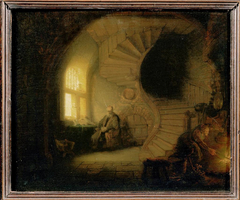WASHINGTON, DC – Today at the Advancing Public Philosophy Conference hosted by the Public Philosophy Network, Cori Wong, a graduate student in the Philosophy Department at Penn State, and I are holding a workshop entitled Philosophy and the Digital Public.
Rembrandt’s image, Philosopher in Meditation, presents a vision of the philosopher as isolated from the world. The Public Philosophy Network and the Advancing Public Philosophy Conference challenges this image by advocating for a vision of the philosopher as deeply engaged with the public and philosophy as a fundamentally human way of being with others in the world.
As part of the larger effort to advance publicly engaged philosophy, our Philosophy and the Digital Public workshop is designed to open a sustained dialogue about the relationship between philosophy and the digital public.
The workshop is divided into three parts. The first part, which I lead, focuses on the transformation of literacy through which we are currently living as we move from print to digital culture. It then turns to concrete examples of how I have used my Digital Dialogue podcast, and other modes of collaborative research to do philosophy publicly in ways that enrich my scholarship. The model here involves the attempt to do philosophy more publicly.
The second part, which is led by Cori, focuses on doing philosophy with and for the public. She has used social media, such as Youtube and her personal blog, to present philosophy to wider public audiences in ways that seek to cultivate and enhance public discourse on issues like racism and homophobia. The goal of making philosophical reflection relevant and accessible to general audiences has required her to develop different pedagogical skills, which are in many ways beneficial for her as an instructor, but this public work on the Internet is also seemingly in tension with the sort of scholarship that is viewed as legitimate, credible, and more valuable when establishing oneself as a rigorous scholar. Furthermore, despite her own skepticism about the pedagogical promise of teaching to the public through social media versus teaching in residence to students in a classroom, a number of “viewers” have urged her to continue this public work and stress that it is important for them and others.
The third part of the workshop will involve the creation of a collaborate digital artifact that captures something of the spirit and nature of the discussion we had and establishes a basis for ongoing dialogue concerning the nature of public philosophy in a digital age.


http://www2.lse.ac.uk/newsAndMedia/videoAndAudio/…
Our iPhones, diaries, computers or collaborators are extensions of our minds, according to a philosophical argument. This lecture investigates the significance of this claim in our understanding of the notion of a self.
Katalin Farkas is professor of philosophy at the Central European University's Department of Philosophy, Budapest.
http://ecologywithoutnature.blogspot.com/2011/10/…